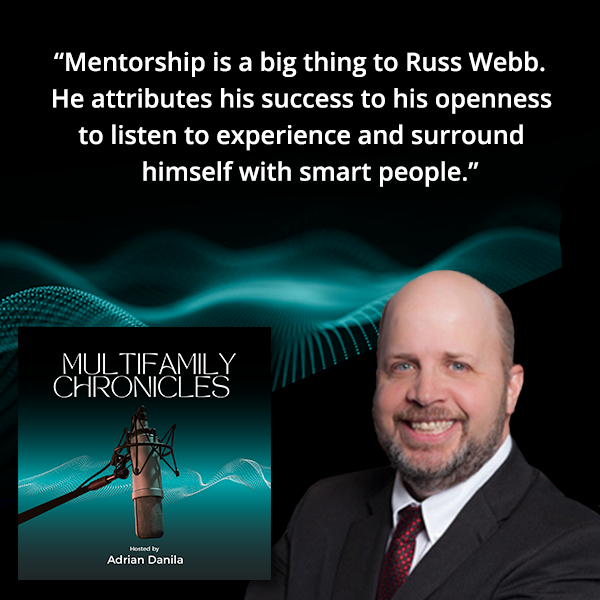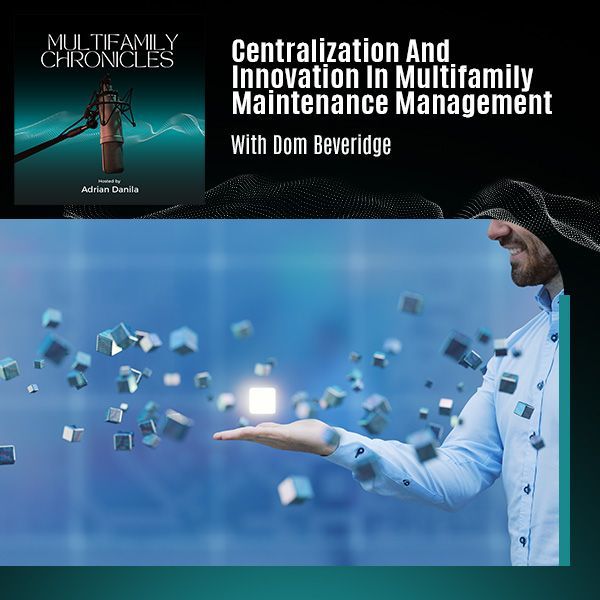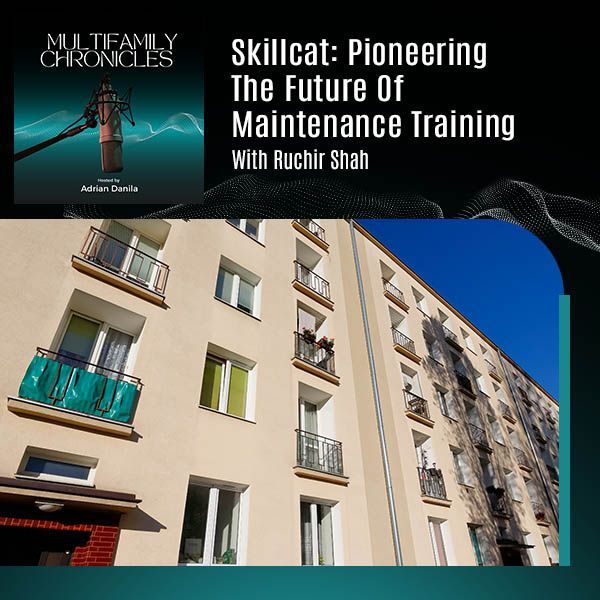Multifamily’s “Family”: What It Takes To Have Happy, Long-Term Employees With Russ Webb
Attracting and retaining the best talent is key to success. But why do organizations miss out on keeping their employees happy? In this episode, Russ Webb, executive director of the Bay Area Apartment Association, shares his journey of building an amazing team that led to their organization’s success in the multifamily industry. Russ shares why making your people happy is more important than looking for short-term skills – especially with the industry's current staffing problem. Russ also touches on resident experience, technology in the industry, leadership, and more. Find out how you can create a successful team and take your business to the next level. Tune in and start investing in your people today!
---
Watch the episode here
Listen to the podcast here
Multifamily’s “Family”: What It Takes To Have Happy, Long-Term Employees With Russ Webb
Our guest is Russ Webb. Russ is the Executive Director of the Bay Area Apartment Association in Tampa. Welcome to the show, Russ.
Thanks, Adrian. Good to see you again.
Russ, for two people that don’t know you in the apartment industry, why don’t you introduce yourself to the two who don’t know you?
For the two that don’t know me, hi, everybody. I’m Russ Webb, Executive Director at Bay Area Apartment Association. My association covers Greater Tampa Bay. That is Tampa St. Pete Clearwater, Sarasota, and Venice. If you look at Florida, the left side and the middle are who we are. It’s all of greater Tampa Bay. We’re the largest department association in Florida. We have about 245,000 units. I’ve been here for a few years. Prior to this, for 21 years, I ran the day-to-day of the Atlanta and Georgia Apartment Association. I’ve been in the space for a long time. This was a cool opportunity to build something down here. Thankfully, I’ve got an amazing team that has helped me do that. Thank you, Adrian. I appreciate that.
Why don’t you share with us a few great things that are going on with your association?

The thing that we’re most excited about now is that we’re in the process. We’re about a month out from launching our professional development center, our training center. The association has been around since 1928. We’re approaching 100 years old, but the association had never had a full-time executive director and staff prior to me because they had been run by a third-party company during that time. The association never had a home. During all this time, I moved down here, and then two months after I moved down here, COVID happened, and the world was on lockdown. My team was operating in a remote environment, and we were still in a remote environment. We realize that we don’t need an office.
What we need is a training center because we do a lot of training and education on both the property management side as well as the maintenance side, specifically on the maintenance side. We are building a professional development center. We’re about 30 days out from opening up, and we’re very excited about that. That’s one of our main focuses now. Also, we’re trying to make sure it’s very important for us that we’re reaching all parts of our membership. We’re looking at all of the programming that we do. My Director of Programs, Krystal Humphrey, is pretty amazing. She is examining everything we do for events and education to make sure the things that we are offering are impacting all parts of the membership. We don’t want anybody left out.
You mentioned maintenance. As you know, I came up in maintenance. I started as a groundskeeper in my career. Maintenance is something that I’m passionate about, and maintenance development of maintenance professionals. Could you elaborate on programs that you have going on for association members with their maintenance professionals and, more so, for people that are outside the industry that want to step into the industry and become part of a service maintenance team?
Typically, what associations do is focus most of our training on the people that are already in the industry. We look at doing all the hands-on primers, all of the refresher courses, as well as the certifications, the CAMT, EPA, CPO, and all of those. We do all of that. In addition, we realized after talking to our members that one of the biggest needs we had now is staffing. The bigger problem is that there’s no pipeline feeding people into the industry. There are zero pipelines. One of the reasons is that, and you and I talked about it in the past, it’s what I call the biggest lie that’s ever happened in the history of our country.

We told everybody that they had to have a four-year degree. Because of that, the trades are losing people rapidly. There are no mechanics, plumbers, or electricians. These are things that we need. We told everybody they had to have a four-year degree. They get into debt, get this degree, and they end up having trouble finding that job. Whereas we all need to tradesmen in such a huge way.
These are the people that move our economy forward. We realized that this was a big need. We partnered with a local college that was able to get a workforce development grant, and we have a maintenance apprenticeship program. We’re in class number three of our maintenance apprenticeship.
What happens is, these apprentices come in and do multiple training, but it’s a one-year program. Most of the time, they’re working OJT, working on the job at a department community. By the time they’re done with the program, they will have their EPA, CPO, electric, AC, carpentry, cabinetry, flooring, and all the skills, including their CAMT at the end of the program. The employer doesn’t have to pay anything, nor does the student for any of that training. It’s all covered by grants. We’re in class number three of that. While we realize this is a great program, the one problem that it does have is that it’s a one-year program. It takes a long time to create a maintenance technician.
We’re also starting another program that’s going to be what we consider tech. We’re trying to do a fast-track program, and in 60 days, we’ll turn out a tech, and they’ll be employed right then. If they stay with the program and with their employer, they will be getting a discount on all future certifications and getting their EPA certification, CPO, and CAMT as long as they stay with the program. We also have a certificate for residential property management, the property management side, and leasing agents that we do at a night school with the same college to be able to try to get people into that side of the field. That’s to get people into the industry.
While they’re in the industry, we do all the normal training that you would think about. We do electrical, carpentry, HVAC, EPA, and CPO certifications. We also offer CAMT twice a year, but for the first time in 2023, we’ll be offering CAMT 100% in Spanish. The class will be taught in Spanish, and the testing will be done in Spanish. We have a lot of Spanish-speaking residents that are here in Tampa Bay, and Spanish is their first language. We realized the need for that. We found an instructor. That program’s going to be launching in 2023, which we’re pretty excited about.
That’s super exciting. I want to ask, how many people graduate each time you finish one of those modules or the program?
For the apprenticeship, it’s anywhere between 8 and 11. For those programs, we’re hoping to get 20 at a time. Every 60 days, we could turn out 20 new techs, which we’re excited about. For the leasing side on that certificate for residential property management, that’s typically 12 to 15 at a time.
Do you think that there’s any value in some of your members coming in to team up with you and replicate this program? How many members do you have in your area?
We have 175 management companies, managing close to 250,000 units.
It’s a wonderful start, having 20 to 30 people each quarter. It’s not nearly sufficient. A single company could absorb all of them and then some. I would hope that some of your members will come and say, “Let’s team up, partner, and do a program for our company.” We need many qualified people, and we can’t get them. This is a way to get them. If you commit to them, chances are they’re going to commit back to you. They’re going to replicate it. Do you disagree?
No. I 100% agree. We have a labor shortage now in multifamilies, specifically on the maintenance side. I don’t know how we’re going to turn that tide because the problem is we can’t create service technicians fast enough to fill the empty positions and the people that are retiring. With competition, being the way that it is, a lot of our service techs are being hired by companies that traditionally have been our supplier partners.

Let’s face it. In commercial real estate, the pay could be better, so they’re hiring out those people. This is important to note. A lot of our companies have finally realized that the service techs are the backbone of what holds everything together, especially on the customer service side. If they take care of those people and listen to what their service technicians are saying, they’re going to be able to retain them for longer periods of time as well. People are leaving because of wages. That’s a matter of life.
A bigger reason why that people are leaving is they feel underappreciated at their job. They talk about The Great Resignation that was going on. I don’t like that term at all. It’s more like the Great Awakening. People have realized, “I don’t have to work somewhere where I’m not happy.” There are many other people out there that are hiring, “I can go someplace where I’m happy and where I’m appreciated.” That’s important. A lot of our companies in our industry are starting to realize that.
There’s so much through and much to unpack in what you said. I’m going to start with the way people are treated. Company culture plays a huge role. The way I see the whole price is happening is that you need to make a certain wage in order to survive. There’s a minimum requirement. I cannot make less than $20 an hour. I’m making up an hour. The number could be $16 or $30 an hour.
At that point, a potential employee will say, “I cannot take a job if I’m taking less than $20 an hour. I’m not making a living. I’m behind on bills. I must make that much.” That’s the cost of living, rent, food, gas, and everything else. The company should be able to provide a living wage. If someone can’t make a living off that type of wage, how could you expect they’re going to be happy at work? How could you expect they’re going to be focusing on the job and give you 100% when, in their mind, “I don’t even make enough money to pay my bills?” That’s the first thing. After you meet that minimum requirement, you put something on top of that and some extra compensation, so people don’t live from paycheck to paycheck.
They come to work because they want to work. They want to be there not because they must make a paycheck. Secondly, culture, the way you treat them. I run many polls on LinkedIn about the way people are underappreciated and treated like invisible people. It’s one of the top reasons over and again, especially in maintenance. I used to say maintenance and vendor partners are the forgotten people of the industry. That has to change. If we want to see better and different results, we have to approach that situation differently. Otherwise, nothing is going to change.
We’re in an interesting place in Tampa Bay because, in Tampa Bay, we have the highest inflation in the country. We led the nation in inflation at 11.7%. You had companies here that were giving their employees mid-year salary bumps only because the inflation had become high. This is not just in multifamily. It’s across the board and in all the different companies. As you said, there is such a thing as a living wage. The living wage in Tampa is not the same as in Dubuque, Iowa. They’re very different living wages. Let’s say that everyone is paying a living wage.
The living wage is X dollars an hour, and everyone’s paying that because you have to pay to get employees. At that point in time, it becomes about culture. In our industry, everyone’s close, and everyone talks. What will happen is someone is at a job, and they’re making money, but they’re not necessarily looking forward to going to work every day. They then talk to a peer who says, “In my company, we get this extra thing, whatever this thing is, this amenity. My company takes care of us. My company listens to us. They believe in mental health. They believe that this is important. They understand how my mental health is a big part of how I play across.”
When companies start learning that, they realize that keeping those employees is a big deal. We’ve got a company in Tampa. That’s a family-owned property management company. They have employees there who have been 25 or 30 years at the company. You’ll find these employees, their children who are now adults, go to work for the company.
They created a sense of culture to the point where no one wants to leave the company. They feel they’re part of the family that owns the company. Although they’re not part of the family that owns the company, they feel that. Anyone can create that sense of culture, and it’s important. When we get to that living wage that we all have to be able to pay the bills, when we get beyond that, that’s the thing that companies need to spend more time focusing on. The generation now, like Gen Zs, they’re looking for experience.
We talked about Millennials. If you were to give a Millennial $10,000, they’re going to buy stuff. They’re going to buy things. If you give Gen Z $10,000, they’re going to buy experience. They believe in experiences. Therefore, they’re not going to work somewhere where the experience is bad. They’re not going to do that because there will be something else that’s out there. I hate when I see someone say, “If they need a job bad enough, they’ll come work here.” If you have that attitude, your HR will be a revolving door of new people all the time.
I 100% agree. You mentioned a privately owned company. That’s a member of your association with long-term employees. They’re bringing their family and their children to work for the same company. How do we replicate that?
We start with that culture. The question that everyone should ask themselves is, “Are my employees feeling appreciated? Do they enjoy coming to work every day?” The more important thing about that is they’re not asking the question. My good friend is from Swift Bunny. Swift Bunny’s entire business model is to help people retain their employees. That’s the entire model of that because they realized that the turnover in multifamily was second only to hospitality. That’s not sustainable.
Joe Bailey told me one time that the amount to hire a new person goes up every not by 1% or 2%. It goes up 5% to 7% every single year of the things you have to do to find and onboard a new person. Why would you want to spend all that time and effort constantly recruiting, trying to get someone trained to have them stay a short period of time when you could spend a little bit of time finding out what are the trigger points that are keeping your people happy?

Mary Gwen from Rent Dynamics is a perfect example of someone who is all the time asking her employees, “How are you? How are you feeling? Do you enjoy working here?” She’s wanting to know how they’re ticking so that they can make sure that working for her property management company is a great experience. Our friends at RangeWater have the same philosophy. They want to make work fun and want people to look forward to going to work every day. There are companies out there that are doing this, but some companies got busy doing the work that they forgot about you’re going to have the people to do the work. It’s replicable. I do.
How do we take the show on the road? Not within our circle, not inside our group, but inside your association or anywhere in a country? We go out, and how do we recruit? For example, I’m thinking about you, me, and a couple of management companies getting together, taking someone with a camera with us, doing a job fair at a high school in town, and telling the kids, “What is it like to work in property management. What are the benefits? What are the great careers that are waiting for them?” This comes with nearly no expense out of their pocket. They could start entry-level as a leasing agent or as a groundskeeper, and work their way up to become the COO or the president of the company.
These are many cases that I know personally myself, and there are many that I don’t out there. Wouldn’t this be a wonderful way for us to sell outside the industry and get to the young generation before they go out there in the world and see 1,000 other opportunities? You compete with 1,000 other trades. Wouldn’t that be a great opportunity for us as an industry to do something like this?
It would be fantastic. I’m sure you’ve done this. Find ten property management professionals and ask them, “How did you get into the industry?” It’s an accidental career. There are a few of them. My mom was in property management, and my dad was in property management. Therefore, I followed them into the industry. For most people, it’s an accidental career. They were in college and decided to do a part-time leasing agent job.

I met a maintenance director who was going to a technical school. He needed a part-time job, so he did a thing for a weekend service technician at the department community. Now he’s the director of 4,500 units. It’s an accidental career. We’ve got to change that. It has to be a career path where when someone is in high school and someone says, “What do you want to do?” They don’t say, “I’m not sure. I may do this.” They want to say, “I want to go into property management.” That needs to happen. You’re right. High school is where it starts. Maybe even middle school. We have those career days. Maybe we need to make sure that there are people out of those middle schools speaking on career days about how property management is a career. That’s important.
We should start a movement. I’ll be the first one to back you up, turning it from an accidental career to one that’s on purpose, an intentional career. It’s not by accident. I would love for us to start something like this. I’ll be all in and be the biggest advocate for that. You had great programs like the ones that you mentioned and others in the past. You are one person. You are one association. We need more of our peers to join us and create a movement. We need a movement.
If we were to make the difference that needs to be made at a property management level, we need to start a movement. It needs to become a movement. Where I’m from, they’re saying that a few flowers don’t make it a spring. You can’t make a spring with a few or a couple of flowers. We need more than that.
I’ve always been a person that’s not afraid to try things. I’ve always told my team, “We’ll try this.” and they’re like, “What if it doesn’t work?” “If it doesn’t work, we’ll try something else.” We try everything. The hope is that when we try things that work well, other organizations will do the same thing. It’s the same way. I will look at what other organizations are doing and the things that have worked well. I’m like, “Look at what they’re doing. This works well. We should replicate that.” That’s what we need to do. We learn from each other.

It’s a wonderful way. Model the masters. You’re looking at successful companies and replicating a model. As you said, at the same time, you don’t do just that. You experiment and try new things. “Let’s see what sticks.” Especially in a labor market, if it’s something that’s going to help the labor market with the shortages, this could be huge. You could be the person or the association that unlocks the enigma of how we solve the main shortages. The price is huge at the end of this journey or exercise.
Agreed, Adrian. I would hope that most companies out there realize that we’re in a different time now. To be able to attract people, you’ve got to do unconventional things. You can’t go the way that you’ve always gone before to find people. We’ve got to be unconventional now, and that’s important as we move forward.
I totally agree. From experience, I traveled all over the country this 2023. I’m talking to Uber drivers. I do a lot of Uber. I haven’t yet met a single Uber driver that will tell me that their job and schedule sucks. They all love it. The gig economy is real. There are people making money by selling stuff on Amazon and selling stuff on the Facebook Marketplace. For Uber drivers, it’s being their bosses. There are thousands and thousands of businesses that are one-person business that does that and make money.
Why would you be unhappy in a job every day when you could take what used to be the side hustle that you enjoyed, and now make it your main hustle? I did the same thing. I met an Uber driver in San Antonio who was taking me back to the airport. She was a neuromuscular therapist. She said she had a great career and a lot of money but was never happy and never enjoyed it. They closed the practice during COVID because of the touch thing with neuromuscular therapy. She started driving Uber and then doing a couple of other things and said she’ll never go back. She loves what she does now. She sets her hours. She works a couple of different jobs. She’s her boss.
That’s what we’re competing with. It used to be you would compete with another company in your space. ABC management company would compete with XYZ management company. Now you’re competing with happiness. That’s who you’re competing with. If you’re not bringing happiness to an employee, then they’re going to find it somewhere else.
It’s such a growing way to put it. You compete with happiness. I did a post before. I said, “If you’re in property management and you are hiring, you have to look at every single opportunity, not just your competition down the street or the other apartment community. Forget about that. This is narrow. If you are looking at your competition down the street and matching what they’re paying for, you pay a dollar more and realize that they have the same pain as you do. You’re not solving a problem. You are replicating a failing model.”
Let’s say the truth the way it is because this is common in the industry, “We’re paying competitive wages, but people don’t want to work.” When I ask, “What’s a competitive wage?” “We ask around and pay whatever in our accounts are paying down the street.” You realize that they have the same issue as you do. If you are expecting that you got to pay the same and have a different result, that’s insane to me.
That is the definition of insanity. Doing the same thing again and expecting a different result is the definition of insanity.
The next topic is another one that I’m super passionate about, and it has to do with training. The National Apartment Association has the camp certification. You could become a certified apartment manager. On the maintenance side, all you have is the PMT. They did some variations where there’s one that has leadership attached to it.
Titles mean a lot. For someone who’s a CEO or a president of a company, they could tell you titles don’t mean anything to them because they are already at the top. It’s the highest that they could go. For the rest of us, titles mean a lot. They matter. This brings me to the next question topic. Why don’t we have, either at the local level or even the national level why we can’t tailor a program for certified service managers or supervisors? I like the service manager because service is way more than fixing things. We’re supervising people and managing. I take this example. How do you get promoted in the apartment industry to service manager? You’re the last guy standing.
Longevity.
You’ve been around. You’ve been attacked. You did a good job as a tech, and then something happened with your service manager. They leave, get fired, or retire. The next person that the manager looks at is going to be you. The way it happens is, “Congratulations. You’ve been a great maintenance technician and service technician. Here are the keys. We wish you the best of luck.” To do this and put responsibility in someone’s hands with no formal training is irresponsible.
You’re talking about a person that is going to co-manage an asset that’s $50 million, $60 million, or $100 million asset. I always go back to this comparison. I say, “If you were to have $100 million or even $50 million, and you hand them to a money manager to make more money for you, that manager would be a successful money manager.” We do the same. It’s not a lot different with the service manager. You hand them the keys and say, “You are going to do this for us. Good luck with that.”
How can that be? It’s heartbreaking. You’re setting people up for failure, and we are living thousands and thousands of money on the table because we’re bleeding money. If you promote someone that doesn’t know what they’re doing, they’re going to make mistakes. It’s going to be a costly experience for you as a management company. Why not just do things differently?
One of the things that we do have is that just because you promote me doesn’t mean I know how to manage people. It doesn’t mean I know how to manage a budget. That doesn’t mean I know how to stock a shop. That doesn’t mean I know how to do the things for cost analysis of items. That doesn’t mean that I have ever had to do anything with due diligence. It means that I’ve been there for a while. I had a community manager one time in Atlanta tell me one of the most amazing things. We were sitting and having a conversation. I said to her, “Are you enjoy managing your property?” She said, “I co-manage my property with our maintenance director.” I was like, “That’s fantastic.”

She said, “I manage the office, leases, and all of that, but he manages the property. He manages the things that break and the things that need to be kept up and the curb appeal and all of that. We co-manage.” I said, “It would be amazing if everyone looked at it that way.” She said, “He has a hand in budgeting and has a voice in everything that we do.” I thought that was pretty amazing. Before someone becomes a manager or supervisor, they need to understand what it means to be a manager. That’s important. For anyone who’s ever managed other people, your first-time managing is pretty scary because you’re afraid to mess up. Typically, if you haven’t had any training at all, you manage most likely the person you follow or the person you saw was your previous manager.
If you could have good and bad managers, at least you know, “I should manage like the good one and not like the bad one.” At least you know that. Some people will never have that experience. A lot of the problems are if they’ve never been told differently than some people think that becoming a supervisor or becoming a manager, that their entire job is telling other people what to do. They think that’s their job. If you think that’s your job as a supervisor or manager, you’ll be a poor supervisor and manager.
You’ll also be going to be in a lot of pain. I could promise you that. I’ll give it to you in writing.
You’ll be doing nothing but hiring people constantly. That’s what you’ll be doing.
I know that you’re big on technology. You speak on technology. You love and embrace technology. You are a leader. Could you tell us about some trends that you see in the industry? I ask this question because I get bombarded with many software solutions for the industry. How can a management company look at all this technology that’s available out there and say, “This is the right technology for us?” What do you see great that’s out in a market that’s useful tools for the site teams mainly to do their jobs with? What’s going on over the board? What’s excessive, and what’s redundant?
As you said, there are a lot of techs for leasing, marketing, and touring. There are a lot of different techs. Even for maintenance, there are some decent tech tools out there. The problem that I have is that these technology solutions are decided upon because of what I call a whiz-bang. Those are some flashy and cool things, and they’re like, “We want to be part of that,” without thinking about what we call a tech stack. The tech stack is how your company is run. When you have a tech stack, those are the things that allow you to be able to function.
You’ve heard me say this before, Adrian. I’ll tell people I’m not in the apartment business, I’m in the association business. That’s the business I’m in. I run an apartment association. I operate my main piece of technology, which is what’s called an association management system. My association management system allows me to handle my dues, events, membership, and everything else.
For me, it’s important that the piece of technology must encompass the things that I have to do, but also allows me to do these extra whiz-bang things, or at least be able to work with another piece of technology to allow it to do that. The work with is the important part. I’ve seen many great, cool, amazing pieces of technology in multifamily that somebody is like, “This is great. This is incredible. We are working on our integration with this and that.”
I’m like, “That working on doesn’t work because if you launch technology and the onsite teams are spending most of their time trying to figure out how to get the software to work with each other, then you’ve caused a problem. You haven’t given them a solution. You’ve caused another problem, and typically it’s a bigger problem.” In this day and age, the things that they need to be focused on are things that can simplify the process for the resident.
The resident experience is the entire thing. Remember, for people that have got their first apartment during COVID, a huge percentage of them never did before, toured their apartment virtually before they leased. This is different from any other time. Before virtual tours were there, then you went to the property, did your tour, fill out your guest card, and all that good stuff. Now there were hundreds and thousands of people leasing apartments during COVID without ever visiting a community.
In this day and age, the things that multifamily need to be focused on are things that can simplify the process for the resident. The resident experience is definitely the entire thing.
Therefore, virtual tours and videos became important. That’s not going to rewind or go away. That’s important to know that’s not going away. There are some video tools out there, and I won’t mention any products by name. I’ll be kind to not do that. There are some video tools out there that are integral to the leasing process. I’ll think about my son touring. His first time looking at apartments is not going to be going to visit places and doing that. He’s going to spend quality time online. If a community does not have a truly engaging online presence, he’s gone.
He won’t even consider them. He would not look at the community at all. That is something that they have to remember. The world nowadays operates off these things right here. This is how the world operates. If you’re on the property management side, the community’s website, or the community’s leasing process is not mobile-friendly, you’re in a bad place. On the supplier side, if your product cannot be handled via mobile, you’ve got a problem. I’m traveling to a conference in Tennessee to speak about technology. Mainly, I talk about mobile tech because I call it the world at your hand.
If your world doesn’t go into my hand in my device, you don’t exist in my world. I’m older. I’m not from the younger gen. The younger gen is even more so than me. I’ll call them the TikTok generation. Think about the TikTok generation that you’ve got. Everything they do is mobile and seventeen seconds. You’ve got that long to impress them, and you got to be able to get them wherever they are. For our people that are in multifamily, we were slow as an industry to grasp onto the technology.
Multifamily was very slow as an industry to grasp onto technology.
I’ve seen companies make some huge advances during COVID, mainly because they had to. Their hand was forced. I want to see that trend continue. I’d like to see people embrace more technology to make the entire resident process easier. We’ve been in this great time for the past few years where the demand has been high for apartments.
They didn’t have to work hard at leasing. It was to take applications and process residents. That’s going to change. We all know the industry is cyclical. I’ve been in it forever. It is a cyclical industry. It’s going to change again, and that’s where that resident experience is going to become so important and how you can use technology to streamline that process and embrace it for them.
I’m also thinking about test trust. Wouldn’t it be a great idea to take a community or a sample of communities and run tests on everything new when there’s a new technology, instead of saying, “This is shiny, and it looks great on us so let’s roll it out?” You roll it out, and then it’s super painful. Wouldn’t be a better idea to take 1, 2, 3, or 5 of the top communities and give the student something to play with?
That’s important. I think of alpha and beta testing products. A company has said, “We’ve been testing this product. We’ve rolled it out successfully in however many communities.” It doesn’t mean it’s going to be successful for your company, and your backend software may be completely different than anybody else who’s using it.
Therefore, it could cause more angst for your teams. If you fix a problem with a piece of software, but you’ve created three more problems, then you haven’t fixed a problem. That’s what you’ve done. I love the idea of being able to say, “This is one of our busiest communities. This is one of our longest communities, one of the highest occupancy communities with lowest occupancy communities,” whatever it may be, and use those as your test subjects. That’s a great idea.
Plus, you’ve been an executive for many years. A lot of people are looking up and thinking, “I want to become an executive one day.” Could you share a few things that help you get and help maintain a tool in a top-level position that you are in now?
The biggest thing is learning from your mistakes. That’s a huge one. You need to learn from others’ mistakes because you won’t live long enough to make them all yourself. You need to learn from others’ mistakes. Surround yourself with people that are smarter than you. Don’t micromanage. That’s important. I believe you hire great people and trust them to do their job. Be there for them as a resource and a support system, but not as looking over their shoulder the entire time.
You need to learn from others mistakes because you won't live long enough to make them all yourself. So you also need to learn from what mistakes others have made, and surround yourself with people that are smarter than you.
I’ve been very lucky to work with incredible people who have helped me everywhere along the way. Find a mentor, and learn as much as you can from that person. Having someone who has walked before you and the shoes that you’re doing and giving you advice is one of the best things ever. I’ve been lucky that I had a couple of amazing mentors. I’ve now tried to be a mentor to a few others. That’s important. For anyone who’s looking to move up, find a great mentor, someone who’s not afraid to say something to you and not going to heat praise upon you all the time. Find a mentor who can give a hard critique of you and say, “This is great, but here’s what you’re doing, and here’s how it’s coming across.” That’s important.
Thank you for sharing. This is amazing. Here’s the next section. I have a few rapid-fire questions for you. Are you ready?
I’m ready.
Favorite books, fiction, non-fiction, professional type books. What do you like?
My favorite fiction book of all time is Catch-22 by Joseph Heller. It’s an amazing book. I have probably reread it fifteen times in my life. There are amazing messages in Catch-22. Everyone should read it. My favorite business book is funny. It’s whatever I’m reading. If you want to do the all-time book, there’s one that’s called What Color Is Your Parachute?
That one helps you figure out who you are and where your skills would be best used. I’m reading a book by David Allen called Getting Things Done. It is a great book. It talks about stress-free productivity and how you transform the way you work by de-stressing. What he is teaching you in this book as I’m reading is if you’re relaxed, you’ll always be more effective. That’s a very powerful book about getting things done. That’s a good one.
How did a failure or apparent failure help you achieve some future success in your career?
Here’s an example of when I said I’m not afraid to try anything. We were in the lockdown of COVID down here. People believed that Florida didn’t have COVID. We did have COVID. It wasn’t as long as everybody else, but we did have it. We tried an event to recognize and support the onsite teams that have been working hard straight through COVID without any breaks or whatever. We did this like an onsite appreciation day thing. I was in my belief that the thing we needed to be doing was good, and was too early.
They still weren’t ready to be out and amongst other folks. We did this thing outside as a big picnic fun day. They were nervous about being out and about that we did it too early. The people who came had a blast. We didn’t get the crowds that we wanted or expected. Because of that, I learned that what I should have done on that one is I should probably have asked a handful of people, “Would this be a good idea?” I should have surveyed the wider membership to see if it was a good idea because the handful of people I asked were all in, and they came, but the rest of the folks did not. That’s a thought there.
What piece of advice do you have for someone young that’s about to enter real life and get a job?
Don’t be afraid to ask questions. Ask as many questions as you can. Especially if you’re doing the interview process, ask a question. Don’t come in blind to a new job. Asking questions and getting as much information as you can is important. The next piece of information I would get them is it’s the same one I gave to the executive. Find yourself a mentor that can help you achieve the path that you want to achieve, even if maybe that path is not the one that you thought it was. That’s important.
In the past few years, what do you believe behavior or habit has most improved your life?
I’ve always believed that work should be fun and that if we laugh, we’re more productive. I will tell you that during this whole period, I went from being in an office with people all the time to being in a remote situation, and I had to have my team connected even though we were remote. We do a morning meeting every morning on Zoom, and there are all six of us on Zoom. It can last anywhere from 15 to 45 minutes. Sometimes I realize we don’t need to talk about work. We need to laugh and be together. That belief system has truly been strong in those last few years in keeping our team. We’re as close as any team could be, even though we don’t sit beside each other in the office every day.
Our conversation here is about to come to an end. I want to ask you in closing. Is there anything you wish you would’ve discussed during this episode? Would you have wished I’d asked certain questions and I didn’t that you had answers for?
No, you talked about one of the things that’s important to me. That is for us trying to spend more time making sure our employees are happy. This is something that I have been preaching for a long time. It is so much work to hire and train a new person. If we were to spend that same amount of effort on keeping our employees happy, imagine what we could do.
We would always be able to bring in new people along the way, but we would have those experienced people to be able to keep that progress maintained while those new people could bring in new and fresh ideas. Whereas if we’re constantly turning over our entire staff, it’s more chaos. It’s managing chaos more than it’s anything else. Thank you for allowing me to talk about my passion for making sure that people are happy where they are.
Russ, thank you so much for taking the time out of your busy schedule to come and be with me and with the audience. I appreciate everything that you shared. I have many other questions that I wanted to ask you, but we ran out of time. I hope to get you back here for a follow-up episode soon.
That’s great. We’ll talk again. Thank you, Adrian. I appreciate you having me on.
Everybody, thank you very much for reading. I hope to see you next episode. Have a great day.





